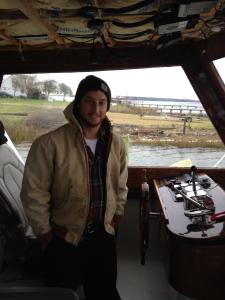Zack Davis

Young Fishermen in the Northeast United States
Interviews with 39 fishers between the ages of 18-35, located along the US East Coast from Maine to North Carolina. Collectively, they represent a wide variety of gear types and fisheries. All had been fishing full-time for at least two years and wanted to make fishing their career. They describe motivations for choosing a fishing career, strategies used, barriers encountered, and facilitating factors that have enabled interviewees to defy the graying trend to become successful fishermen.
Please visit the Voices SoundCloud page to explore clips and stories that relate to this collection.
Sarah Schumann
Zack Davis, 35 years old at the time of the interview, is a shrimp fisherman, high school shop teacher, and net maker in Marshallberg, NC.
Scope and Content Note
In his interview, Zack talks about hiring his high school students for summer fishing jobs, the changes he has seen in the local seafood market, and why he chose to lead a dual career as a teacher and a fisherman. He traces his fishing career back to his family's history, where fishing has been a tradition for generations. Zack mentions how the market for smaller shrimp has declined due to imports, driving prices down. He also talks about the challenges and uncertainties in the fishing industry, particularly regarding regulations that have been proposed, which could have potentially put him out of business. Zack notes his love of fishing and being on the water. However, he acknowledges the declining number of local residents involved in fishing and boatbuilding, highlighting the changing dynamics of coastal communities like Marshallberg. He mentions that while some people still engage in boatbuilding and fishing, many have shifted to other jobs like working at Jarrett Bay's big industrial park in Beaufort.
Zach also highlights the impact of regulations on the fishing industry. He talks about the decline in fish houses and the shrinking of the fleet, explaining how regulations have affected the industry's dynamics. He stresses the importance of adapting to changing circumstances and the need for young people to be prepared for a constantly evolving industry. Furthermore, Zach shares his perspective on the future of commercial fishing and the importance of consumer demand for local seafood. He expresses his concerns about the political strength of the commercial fishermen and the need to convince regulators of the industry's importance and its ability to provide fresh, local, and organic products sustainably.
Zach notes the continuous learning process in the fishing industry and the value of learning from experienced fishermen. He highlights the importance of innovation and the positive impact it can have on fishing practices. Fishing, he says, is a lifelong learning process: “Every single day that you leave the dock is a learning experience. And if you’re not looking at it like that, you’re not looking at it the right way…. There’s nothing that I would say that I know without a doubt to be fact. I don’t think that I can say anything, at least in the fishing industry, to be factual information. ‘Cause every time I feel like I got something figured out, somebody either does something different, or goes here when I think they should have been in this place, or they go there, and, ‘Well, I was wrong.’ I can’t remember the last experience that I had, but it was just the other day. I thought to myself, ‘Well, there you go. You learn something every day.’ Just a little something. You know? Every captain’s a rookie. Every captain’s a rookie. I don’t care if you’ve been in it seventy years or seven years or seven minutes. At some point or another, you’re a rookie.”
Please Note: The oral histories in this collection are protected by copyright and have been created for educational, research and personal use as described by the Fair Use Doctrine in the U.S. Copyright law. Please reach out Voices@noaa.gov to let us know how these interviews are being used in your research, project, exhibit, etc. The Voices staff can help provide other useful resources related to your inquiry.
The NOAA mission is to understand and predict changes in climate, weather, oceans, and coasts, to share that knowledge and information with others, and to conserve and manage coastal and marine ecosystems and resources. The Voices Oral History Archives offers public access to a wide range of accounts, including historical materials that are products of their particular times, and may contain offensive language or negative stereotypes.
Voices Oral History Archives does not verify the accuracy of materials submitted to us. The opinions expressed in the interviews are those of the interviewee only. The interviews here have been made available to the public only after the interviewer has confirmed that they have obtained consent.
